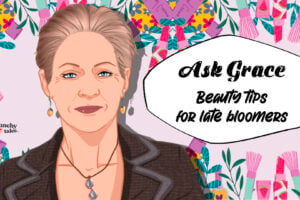Let’s Re-Brand the Menopause
Whether you are dealing with mood swing, sleepless nights, palpitations, hot flushes and brain fog or be one of the 20% of women who is sailing through it effortlessly, it’s time to talk about menopause. There is still a kind of stigma attached to it that makes many women feel like they can’t talk about it, which makes it even tougher to deal with. Menopausal women tend to suffer alone, mortified by hot flushes and bewildered by hormonal mood swings, thinking they should retire into the shadows in case it bothers anyone else. Menopause definitely needs a re-brand. Getting together to talk about it, sharing the common sense from women who are going through the same, might help.
The Menopause Festival
In 2017, Rachel Weiss, together with Gail Jack and Lorna Fotheringham, inspired by Kirsty Wark’s BBC programme ‘Menopause and Me’, had the idea for a Menopause Café in Perth (Scotland). A discussion group, rather than a support or counselling session, with the aim to become more empowered to deal with menopause symptoms over coffee and cakes, breaking the taboo while having some fun together.
They didn’t know whether it would just be the three of them talking to each other, or if other people would join them. About 30 people turned up and talked, and asked for more Menopause Cafes. Today, with Kirsty Wark as its patron, the charity is going from strength to strength, causing similar cafés to pop up across the UK and in Toronto, Canada, followed by a popular annual Menopause Festival.
Now in its second year, the #FlushFest returns to Perth (Perth Theatre 26th and 27th April) and will be officially opened by Christine McKelvie MSP, Scotland’s Minister for Older People and Equalities. Highlights include a dedicated ‘Menopause at Work’ seminar (with guest speakers including Kate Wyatt, employment law partner with firm Lindsays); Dr Laura Jarvis‘ from Tayside Menopause Clinic Q&A and a masterclass from the American speaker, Kelli Jaecks, the “menopause survivor” who has recently released her book, Martinis & Menopause, inspiring women everywhere to live their best lives, no matter their age.
The Menopause Celebrity Movement
Since more and more women have started to talk openly about it, even celebrities have joined the movement adding a touch of glamour to a subject often neglected by media. Among them: Pamela Anderson, Jane Seymour, Whoopi Goldberg, Gillian Anderson and Susan Sarandon who accepts menopause for what it is. For her, menopause (at age 54) arrived “uneventfully”, a period unmarked by major menopausal symptoms and free from creams or surgeries. In addition to a good diet, exercise, and stress management, Sarandon embraced menopause by living a healthy lifestyle. Recently, Gwyneth Paltrow has revealed she wants to change the way women think and talk about the menopause. In a new video for her brand, Goop, the 46-year-old actor confessed that she’s experiencing symptoms of perimenopause, a precursor to menopause in which the ovaries gradually begin making less oestrogen.
I think menopause gets a really bad rap and needs a bit of a rebranding- she explained-. I don’t think we have in our society a great example of an aspirational menopausal woman.
The Good Menopause Guide
It’s true, the menopause and perimenopause can bring an array of uncomfortable symptoms, however, tweaking our lifestyle and sharing our thoughts with others can have a powerful impact in helping to restore balance. But if you start waking at 4 am, heart racing, body on fire and unable to get back to sleep, it’s also important to talk to your GP. The good news is that, once your body has adjusted to the hormonal shift, the extreme symptoms often subside. Meantime we can start to improve our diet.
The Wellbeing expert and entrepreneur Liz Earle, author of the book ‘The Good Menopause Guide’, suggests foods we should eat to avoid those symptoms, ensuring women look and feel the best they can.
Food has such tremendous power to help and heal our changing bodies, and what we choose to eat is one of the most important wellbeing factors we can control in life – Liz says – Eating the right balance of nutritious and healthy foods can make a real difference to how we look and feel – especially during the perimenopause, which is the stage that then leads into the menopause.
Her special ingredients for looking and feeling well during the mid and later life include Phyto-oestrogens.
There are many foods we can eat that may help certain symptoms. Some plants, for example, contain phytoestrogens, compounds found in foods such as soya and flaxseeds, tofu, miso, pumpkin seeds, sesame seeds, sunflower seeds, celery, rhubarb and green beans, which can act in a similar way to oestrogen.
Increasing our intake of certain vitamins and minerals can help combat physical changes that the menopause brings, such as brittle bones and dry skin, as well as deficiencies which may be mimicking or aggravating menopause symptoms. Try to incorporate foods rich in the mineral selenium in your diet as this helps protect cells and tissue from damage. Just one to two Brazil nuts will provide you with your recommended daily intake of selenium.




